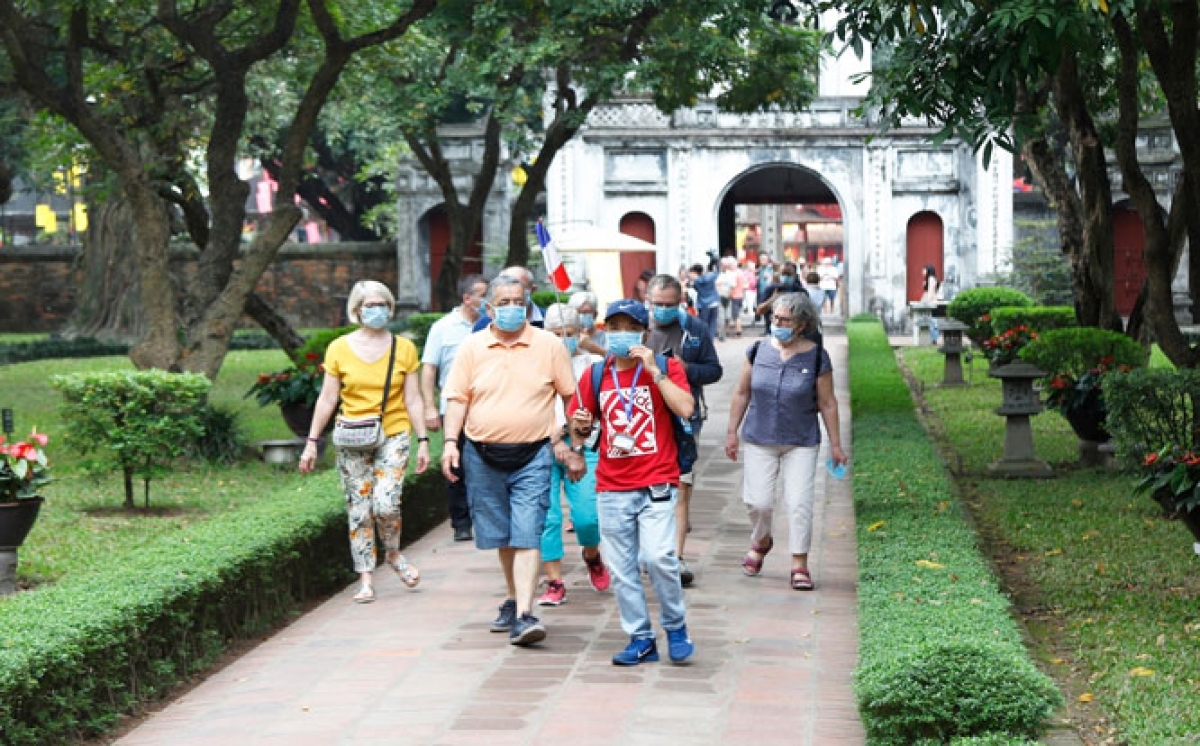 |
On April 26, the Private Economic Development Research Committee under the Prime Minister’s Administrative Reform Advisory Council and the Tourism Advisory Council (TAB) shared with the local media some information related to a survey on the resilience of tourism businesses amid the Covid-19 pandemic.
The government’s key role
Answering questions about welcoming foreign tourists, Mr. Hoang Nhan Chinh, Head of the TAB Secretariat, said: “The TAB strongly supports the Government’s policy on not exchanging Vietnamese people’s health for economic benefits.”
The TAB proposed that the Government and relevant authorities pay special attention to how Vietnam can reopen its borders in a safe and sustainable way.
Chinh noted that Vietnam should only open its door to international tourism when we can assure that visitors do not bring the virus to Vietnam and vice versa. Visitors must also be assured that they are not infected with disease when traveling to Vietnam or if there is a risk, they will be insured.
“The tourism industry alone cannot tell when and how to open the door for international visitors to Vietnam. Our point of view is that all parties should sit down to discuss and we must consider the interests of all, not only the interests of the tourism industry,” the TAB Secretariat’s chief said.
According to Chinh, Vietnam should learn lessons from other countries, both lessons of success and failure. The country will also need to create its own way suited to its capabilities.
He admitted that opening the door to foreign tourists is the desire of the tourism industry. Opening up will create jobs, increase revenue, and help Vietnam not lag behind other countries. If international tourists go to tourist markets of other countries, they will not come to Vietnam anymore.
Chinh emphasized the key role of the Government in making the decision.
Expect to gradually open from Q3
Ms. Pham Thi Ngoc Thuy, Director of the Office of the Private Economic Development Research Committee, said that before the outbreak of Covid-19, revenue from international visitors was very high.
In 2019, the tourism industry contributed 9.2% of Vietnam’s GDP, employed about 2.2 million direct workers and a total of 4 million, including indirect laborers. In the same year, Vietnam welcomed 18 million international visitors, earning total revenue of $18.3 billion, accounting for 56% of total tourism revenue. Earnings from 85 million domestic visitors were estimated at $14.5 billion, or 44%
Thuy noted that losses of the tourism industry are not only from the absence of visitors but also from spending to maintain accommodation facilities.
According to Chinh, the specific time for the opening to international tourists depends on Vietnam’s preparation and ability to welcome international tourists in the context of Covid-19 pandemic, and the Covid-19 vaccination campaign in the country and in the partner countries. However, he expected that Vietnam can gradually open its door from the third quarter of 2021.
To prepare for the re-opening, Chinh said that it is necessary to establish a group or organization consisting of experts from different agencies and fields such as health, diplomacy, public security, national defense, culture – sports and tourism to discuss and set up the open-door criteria.
He noted that re-opening needs to be safe and done with a roadmap. The consultant team has suggested tasks to prepare for the re-opening.
First, conduct bilateral negotiations with each country that has already met the disease safety criteria; introduce disease safety policies such as requirement for immunization passports; and require Covid-19 PCR test before flying and arrival check.
Second, the government should have a compulsory travel health insurance policy, which includes Covid-19 insurance for all international tourists to Vietnam and Vietnamese tourists traveling abroad. Covid-19 insurance is needed to ensure the rights and safety of travelers, travel agencies and local authorities if there is tour cancellation or delay. It also ensures medical inspection, treatment, evacuation and repatriation.
Third, the Ministry of Finance should allow insurance firms in Vietnam to sell travel insurance products related to Covid-19 like other epidemics as prescribed by law. The tourism industry needs to develop a process to welcome and serve tourists safely.
Fourth, it is recommended that all hotel and restaurant staff, as well as those working at the tourism and heritage sites and other tourist sites, are prioritized for vaccination.
“We affirm that a vaccine passport is not considered the only and most important solution. This is just one of the solutions to ensure safety. The World Health Organization (WHO) has not yet recognized vaccine passports. Therefore, we do not want the Government of Vietnam to see the vaccine passport as the only safety measure, but to have an overall look,” Chinh said.
Thu Hang



